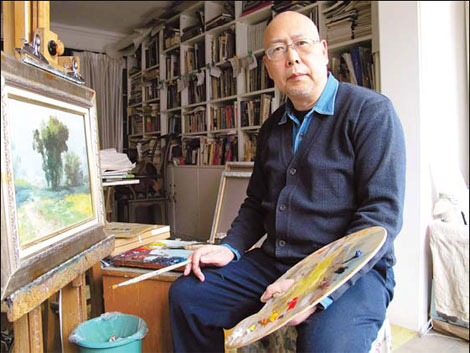In search of Mao
 |
|
"I want to highlight Mao's life-long pursuit for an ideal man," says Wei. [China Daily] |
When Wei talks of his life, it is hard to imagine him spending years creating portraits of Mao. His father, Wei Siwen (1910-67), was beaten to death in 1967, during the most chaotic days of the "cultural revolution". After his father died, he and his family suffered discrimination for several years. "My siblings and I saw little future in our careers," Wei recalls.
One day in 1972, Wei mustered his courage and went to Zhongnanhai, headquarters of the Chinese Communist Party and central government. He recalls wandering for hours outside the gate before handing one of the guards a letter addressed to Chairman Mao Zedong.
"I had to appeal to Mao to exonerate my father," Wei says.
Wei had good reasons for optimism. His father was a senior revolutionary, a World World II army veteran and lieutenant general. He served for 10 years as president of the Beijing Institute of Technology, New China's first engineering college. "My father didn't deserve to die like that," Wei says, "but I was also prepared to be rejected and even to go to jail for it."
Instead of going to jail, he secured a permanent position as an artist with the military history museum and the life of his family began to improve.
The first time Wei visited M50 in 2007, he says that he was disappointed to find that the art galleries were displaying pieces full of satire and ridicule. It was only when he stepped into the Sunbow Gallery, that he felt relaxed and comfortable.
"I think the ultimate pursuit of any artist should be truth and beauty. Many galleries go for visual stimulation and sensationalism - but not mine," Cai explains.
Wei and Cai immediately became friends and Cai offered to hold an exhibition of Wei's Mao paintings.
"We agreed that he should produce 30 pieces in three years - which seemed reasonable at the time," Cai says.
However the painting proved to be both exhausting and time-consuming. Four years passed and Wei had still only produced 13 of the 30 paintings.
"I thought they were sufficient for an exhibition. And I have lots of respect for Mr Wei's integrity as an artist - he could repeat an idea and create two or more similar paintings and easily make more money, but he won't do this. I admire him for that," Cai says.
Cai's father was an army officer, and he used to buy badges bearing Chairman Mao's portrait. In the 1960 and 70s, many of these badges were made and sold all over China and Cai's father would buy one as soon as a new pattern came out.
"We moved house several times, and miraculously we kept all these badges," Cai recalls. "When I got married and had my own home, I asked my father for the collection, and he gave them to me - it has become part of the family heritage."
He says that in many ways Mao is like a father to him. "History can't be re-written - just like you can't change your father. Whatever mistakes your father made, you still bear his DNA. Your father's the one that forms you, and decides who you are today".
He says that he grew up to the melody of East is Red, and says that while it is good to be able to re-evaluate and criticize Chairman Mao, he believes that is no excuse to insult him.
"Some avant-garde artists used to say 'Bury tradition! Let it die', but they don't see that contemporary art exists in a historical context - tradition is the background for the avant-garde," Cai says.
He explains that what he is trying to do is create an artistic link between the country's past and its future: "While pioneering artists ignore traffic lights, and conservative artists hesitate in front of a zebra crossing, I want to build an elevated path that links tradition and the future," he says.
The exhibition will run until the end of June.
 0
0 







Go to Forum >>0 Comments